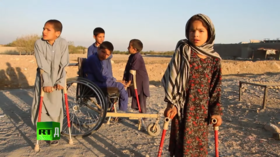Afghanistan after the US: Human stories behind America’s longest lost war

The US has withdrawn from Afghanistan after 20 years of war, with nothing to show for it but a swift Taliban takeover and a flood of refugees. RT asked Afghans and Americans what the price of “nation-building” has been for them.
The US invaded Afghanistan in October 2001, accusing the Taliban government of sheltering Osama Bin Laden and Al-Qaeda, blamed for the September 11 terrorist attacks on the World Trade Center and the Pentagon that killed nearly 3,000 Americans. Except Bin Laden got away, and the mission changed to building a “democracy” through counter-insurgency, drone strikes, and paying local warlords.
‘Afghanistan after the US’ looks at the story of America’s longest war through the eyes of military and intelligence veterans involved, Afghans who fought both for and against the Taliban, and civilians caught in the crossfire.
Also on rt.com ‘They attacked us & killed our children’: Grieving Afghan fathers demand fair investigation of US drone strike in Kabul (VIDEO)“I wanted to be a hero, I wanted to help people and do good,” said Brandon, who enlisted in the US military in 2005. Instead, he found himself operating a drone and killing a child during a mission – something that’s haunted him like a “dagger in [the] chest.”
“It’s point click and kill! It’s so easy that anyone can do it,” he said. “Children were written off as dogs. Innocent people were written off as collateral damage. Just tally marks in a book.”
Some Afghans initially believed that the country would flourish under the Americans, but once the invasion happened, “the people immediately understood their real essence and the cost of American democracy,” said Jelaluddin Shinwari, a former Taliban judge.
Mohammad Amin Mokhliszada, a bitter anti-Taliban fighter, accused the US of keeping the Taliban on life support in order to “continue to rule our people with the help of dark and ignorant forces.”
Also on rt.com The West criticizing the Taliban for a ‘lack of diversity’ is exactly why it failed miserably in AfghanistanFormer senior Taliban commander, Sayed Mohammad Akbar Aga, pointed out that the US and its allies built very little or nothing during their 20-year occupation. “The USSR built a lot for us, and these structures are still standing, while America built nothing!”
While some of the Afghans who helped the Western forces were flown out by the US and its allies during the two-week Kabul airlift, thousands were left behind. Of more than 110,000 Afghans who made the flights, most were civilians seeking a better life in the West.
Others who were displaced by fighting had no option of leaving Afghanistan. “There was war all around us. It was either the Taliban shooting or some other forces,” said Alima, a refugee from the Faryab province interviewed at a refugee camp in the desert outside Mazar-i-Sharif. “Our houses were destroyed. One of my sisters was [killed in an airstrike] and died a martyr's death. Another sister was killed by a tank shell. That's how we roamed and suffered until we escaped here.”
Also on rt.com Chris Hedges: The revengeful suffering orchestrated by the American empire on Afghans will be of Biblical proportionsThe US also tolerated the cultivation of poppies, used to produce heroin. CIA whistleblower John Kiriakou recalled how he alerted the State Department of the problem in 2009, only to be told by then-Secretary of State John Kerry that “it all goes to Iran and Russia, and we don’t care if they’re heroin addicts.”
Osama Bin Laden was tracked down to Pakistan and killed in 2011. The last US soldier left Kabul on August 31, 2021. The Taliban have now retaken power, and the future of Afghanistan appears entirely in their hands.
‘Afghanistan After the US’ premiered September 10 on RT Documentary.
Like this story? Share it with a friend!














